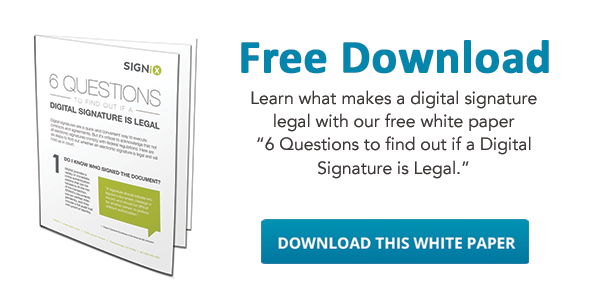There was a time when business was simple. If you wanted to go into partnership with someone, or enter into a sales agreement, chances are they were in the same city or town. You had a meeting, you agreed on the terms of the deal and you signed a contract.
Ever since the advent of widespread Internet use in business, things have become a little trickier. However, we think that digital signatures are the solution to the problem of doing business in the global village!
Let's look at the pros and cons of using digital signatures for business, starting with the pros:
- They're fast. Instead of waiting for documents to be sent by courier around the globe, your contracts can be completed and delivered with digital signatures in a matter of seconds.
- They're less costly. Email has made communicating a lot cheaper, and couriers cost a lot of money, so why not combine both, using digital signatures, in your business?
- They're secure. Your contracts are even more secure because they're not traveling around the globe to reach you!
- They're as authentic, and as reliable, as a real signature. When done correctly, digital signatures will stand up in court, just like any other contract or document, signed in the real world.
- They are less risky. Because digital signatures use secure platforms, there's less risk of fraud, and you can be sure of greater document security.
With any new technology, there can be a down side - so let's look at the cons:
- More traditional clients and business partners may doubt the integrity of digital signatures. However, there is a growing body of evidence that a properly executed digital signature is no less binding than one done with a pen.
- There can be a cost involved in getting professional, verifiable and genuine digital signatures. However, when you offset them against the cost of couriers, printing and copying, company time spent and then you weigh in the benefits, that cost is minor by comparison.
There's no doubt that new technologies like digital signatures can take some time to be accepted by the mainstream business world. There will always be those who favor the traditional means of doing things.
However, we at SIGNiX, are at the forefront of developing the technology that allows fast, secure, irrefutable digital signing of all kinds of documents, and we are constantly improving both processes and practices.
So whether you're looking for a method of having international agreements completed that's more cost effective, or whether you're committed to the paperless office revolution, SIGNiX digital signatures might just be the solution you're looking for!
%20formatted-1.png?width=2528&height=739&name=SIGNiX%20Logo%20Main%20(white)%20formatted-1.png)

